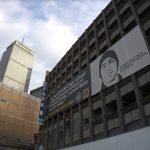
A professor from Johannesburg, South Africa, spoke at Boston University Tuesday about how music and the arts were a part of South Africa’s transition into apartheid, a system of racial segregation which began in 1948 and ended in the 1990s.
Brett Pyper, the head of the School of Arts at Witwatersrand University, spoke as part of the Seeing and Not Seeing Series, four lectures that are exploring different ways of looking at global actors, events and movements without focusing on a specific academic discipline.
Tuesday’s lecture, called “Listening and Not Listening: Jazz and Sociality in South Africa,” focused on how analyzing the musical movements of jazz in the early 20th century can offer a better understanding the culture of South Africa during the period.
Jeffrey Rubin, associate professor of history at BU and the organizer of the Seeing and Not Seeing seminars, said the goal of these lectures is to look at political and social events in multiple ways simultaneously.
“What we are trying to do is to develop a new approach to social science research and analysis, or what we might call a new social science sensibility,” Rubin said.
Pyper used his scholarly expertise and personal experience from living in Johannesburg to highlight how music and the arts contributed to the political apartheid transition in South Africa.
Pyper began by establishing contextual details about how South Africa entered this transitional period, focusing on the emergence of the mining industry in this region.
Pyper said he believed that this mass industrialization caused colonial powers to put a lot of emphasis on the race and ethnicity of the populations, but it also caused the local communities to look to identify themselves as well. These conditions allowed for music to take center stage in the South African experience.
“You get these contracts that were negotiated between various state authorities and the mining houses from the late 19th century, that deliberately conspired to drive millions of Africans from across the whole Southern African subcontinent into the mines,” Pyper said. “So what this makes for is a particular kind of socio-cultural condition that manifests in music.”
Pyper went on to explain that he believed the jazz movement meant more than entertainment for the South African native community; it symbolized the reconstruction of their identity that had been so heavily influenced by outside forces.
Pyper went on to say he was motivated to participate in this lecture series because of its multidisciplinary approach.
“I was really honored and interested that there is this very interdisciplinary, even post-disciplinary, forum at BU that encourages people to think in a very open way about how their research connects across disciplines,” Pyper said.
Katelyn Ching, a junior in the College of Communications, said that she thinks these lectures can feel too specific to one topic of interest.
“It really depends if you actually care about the subject,” Ching said. “I don’t have the strongest of opinions on a lot of things. So for me, I don’t really have a desire to go to those kinds of things.”
Maud Robert, a junior in the College of Arts and Sciences, said she thinks these lectures provide a unique opportunity to learn concepts that reach beyond the classroom.
“You can grow your understanding and discover new things,” Robert said.“You can enhance your understanding of many issues and topics and sometimes you can’t really do that in one of your classes.”
Carolyn Quinn, a freshman in CAS, said she thinks lectures focusing on cultural issues are important because they offer a different perspective.
“There is more of an interesting perspective,” Quinn said. “It’s not academic and gives other information about life.”














